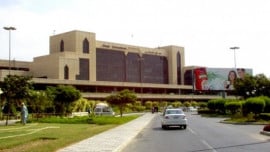
LAHORE: Agricultural experts have said that developing countries like Pakistan will have to adopt genetically modified and biologically-engineered crops in the shortest possible time to ensure food security for their rapidly growing populations.
“The sale of illegal and/or substandard seeds, especially Bt cotton seeds, is another important issue that needs to be addressed by the government on a priority basis to tap the true potential of agricultural productivity in the country,” they stated unanimously, while speaking at an extraordinary general body meeting of the Farmers Associates Pakistan – a representative body of the farming community – here in Lahore.
The event was attended by a large number of farmers from different parts of the country, as well as representatives of different seed companies. On the occasion, corn growers urged the government to approve genetically modified (GM) corn, which is being planted successfully across the globe, for commercial plantation in Pakistan.
Agri scientists were of the view that the sale of illegal and substandard seeds was wreaking havoc on agriculture in Pakistan, and there were fears of a significant decline in the production of important crops, especially cotton, if the government did not check the sale of fake seeds. They said the issue can be resolved gradually through the development of a professional seed industry in the country; adding that the government’s role was critical in this regard.
Dr Iftikhar Ahmad Khan and Dr Iqrar Ahmad, from the Centre of Agricultural Biochemistry and Biotechnology, University of Agriculture Faisalabad (UAF), informed the audience that a study on Bt cotton seeds conducted by the UAF revealed that Bt gene expression in most Bt cotton varieties currently available in the country was very low.
“According to the study, only four out of a total of 52 Bt cotton varieties available in the market had the standard gene expression. That is the reason why the country has been unable to fully benefit from this high-yielding technology,” they said.
In his presentation, Dr Aftab Bashir, who is the principle scientist at the National Institute for Biotechnology and Genetic Engineering, said food scarcity will be the biggest issue in the near future because of a population explosion. “Biotechnology is safe and should be fully deployed. Biotech crops are assessed for environmental, food and feed safety by regulatory authorities before being allowed to be grown or sold commercially,” Aftab said.
National Bio-safety Centre Deputy Director Afzaal Ahmad Naseem informed that the National Bio-safety Committee (NBC), the apex regulatory body responsible for testing and approving GM crops and organisms in the country, has processed 185 cases so far, adding that NBC usually takes two to four years before commercialisation of these crops.
Published in The Express Tribune, November 15th, 2012.


































1713509570-0/Taylor-Swift-Album-Release-(1)1713509570-0-270x192.webp)























COMMENTS
Comments are moderated and generally will be posted if they are on-topic and not abusive.
For more information, please see our Comments FAQ